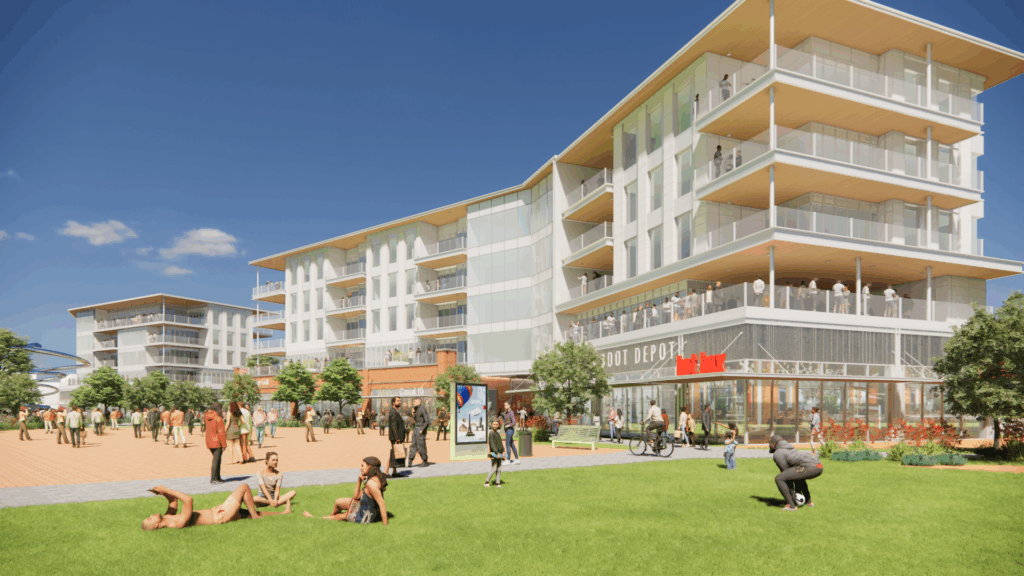A CRE quick read
Takeaways from our Annual Real Estate Magazine

The Business Record’s Annual Real Estate Magazine was released April 26. As in previous years, we held a series of roundtable discussions with experts in the industrial, land, office, residential and retail sectors and selected the highlights for a series of articles. You also can watch the discussions in their entirety at BusinessRecord.com/arem.
In case you haven’t had a chance to read through the magazine, here are some takeaways from each of the discussions.
Housing as a service
from the Residential roundtable
Homeowners know the drill: You mow the lawn, you change the furnace filter, unclog the drain, pay the mortgage and the property taxes. You spend a fair amount of time servicing your home. Well, the market is moving beyond that subservient relationship to something called housing as a service.
“I think that’s a growing trend we’re going to continue to see,” said Jared Husmann of KW Commercial.
Few on our panel of experts disagreed.
“We still look at, and talk about, homeownership being the American dream. I think it’s just generationally shifted a little bit or changed a little bit,” said Dan Knoup of the Home Builders Association of Greater Des Moines. “It’s not as important. But when we look at the debt that the millennial generation is coming out into the world with, and they’re entering the marketplace later, they still have a lot more debt than we had as a generation when we first started buying. So I think it’s a little bit of a shift in priorities.”
Karie Kading Ramsey of Kading Properties said that shift is showing up among empty nesters as well as millennials.
“I think people want those services, they want those convenience things, and they want to be able to pick up and move if they want to, and leasing allows that,” she said.
Aside from having someone else be responsible for maintenance, that housing located downtown near restaurants and bars and entertainment could be all the service necessary, Husmann said.
Reverse logistics or e-charity
from the Industrial roundtable
The panel touched a bit on reverse logistics. It’s trending in the warehouse and distribution market and describes centers that are set up to return online purchases.
So far there isn’t a lot of demand for such centers in Central Iowa, but that doesn’t mean we aren’t avid online shoppers. It’s just that e-commerce is providing alternatives.
Jackie Johansen, founder of Shattered Glass Development, said about 8 percent of in-store purchases are returned. That number jumps to 15 to 30 percent for e-commerce purchases.
Johansen said she isn’t a big online shopper, but has had a couple of experiences with attempting to return purchases that she has made. “They don’t want it back,” she said.
“One was a large dog bed and they said, ‘Take it to your local animal shelter if you would and we’ll send you the next one.’ And I’ve had that on the boutique side before — ordered a garment that didn’t fit right and I called and they said, ‘Donate it, we’ll send you a new one.’”
And besides, many online retailers have returns covered.
“If you’ve got an Amazon package, there’s literally instructions in the packet how to send it back,” said Kevin Crowley of NAI Iowa Realty Commercial. “There’s probably a specialty group within Amazon that just deals with returns.”
Parks and recreation
from the Land roundtable
Let’s face it, some of the cities in Greater Des Moines are growing like weeds — not the noxious kind, mind you, but they are growing darn fast. Nick Halfhill of Landmark Development Services said Ankeny is likely to hit 100,000 residents much sooner than what would have been projected a decade ago. It’s not alone in that growth spurt.
There isn’t much in the way of local geography to slow growth.
“We don’t have that natural barrier that says it’s wetland so we’re going to jump that area. It’s all sort of developable,” said urban planner and designer Dennis Reynolds.
“Some communities that maybe 20 years ago we all looked at as benchmarks and some of them maybe are having issues with loss of green space, traffic issues,” he said. “I think we really need to be proactive in terms of how we manage these big-picture issues.”
One area that is opening to development sooner than expected is 1,800 acres of land Knapp Properties owns along the Raccoon River. A $1 billion Microsoft data farm is leading to a road system that will cut through four counties, providing routes to malls and highways and cities large and small.
Several years ago, Knapp Properties entered an agreement with the Iowa Natural Heritage Foundation that will preserve forests and wetlands.
“There are a lot of restrictions on what’s happening there,” said Aimee Staudt, vice president of development for Knapp. “In some ways, it does almost create a buffer.”
“Our flood plains are some of the best natural areas that we have in Iowa,” Halfhill said.
A theme: A resurgence of storefront retail
from the Retail roundtable
The folks who study the studies and read the data are upbeat about the future of brick and mortar retail in a variety of forms.
“Physical retail is really making a resurgence in a lot of areas and probably doesn’t get as much press as it should,” Richard Hurd, president of Hurd Real Estate Services, said. “We still have the weak retailers that are still closing stores, but the other side of it is that there’s more stores opening. There will be more openings in 2019 than there are closures.”
“Clicks to bricks” filled several snippets of conversation. It is used to describe online retailers that take to the streets.
“I think it’s more of an evolution than the retail apocalypse that everyone has talked about, especially if you look at digital native retailers,” retail consultant and author Laura Rowley said. “They have the data that tells them where to open the stores. There was a retail study that found digitally native brands are going to open 850 stores this year. It’s a burgeoning area of the market.”
The digital retailers are “able to keep track of their online sales and they’re really able to dig in and make some important decisions on what markets they should be in, where they should be in those markets,” said Collin Nelson of Cushman & Wakefield Iowa Commercial Advisors.
Citing a study by the International Council of Shopping Centers, Aaron Hyde of JLL noted that online retailers reported a 37 percent spike in internet traffic after they opened a brick and mortar store.
“High-quality real estate’s going to be very, very competitive,” said Tim Leach of the Greater Des Moines Partnership. “That said, B and C space still may have some struggles. Some of those midtier, lower tier malls seem to continue to struggle, but high-quality real estate is going to be very competitive.
In the doghouse
from the Office roundtable
One guest at the Business Record’s Newsroom 515 that focused on the office sector wanted to know what it was going to cost him to have a dog at work.
Our panelists were in general agreement that although the time is coming, it might be too soon to worry about the expense; few landlords are allowing pets at work.
“We have started to see requests for that in Des Moines,” said Kim Augspurger of Saxton Inc., but few examples of it in action.
“I have seen dogs in offices. None of the institutional landlords are doing it yet, to my knowledge. I have seen Fortune 500 leases mandate it and landlords say ‘no.’ So we’re not quite there yet, but just like all the other coastal trends, I think someday we will see it,” JLL’s Kate Byus said.
Geoff Wood of Gravitate Coworking allows pets in the office.
“We’re dog-friendly. If you want to see dogs, come see us,” he said. “You saw this in multifamily. It used to be that dogs weren’t a thing. And then everybody started getting dogs, and so they’ve had to change. I guess all it takes is one large user that says, ‘We’re not going in unless you let dogs in’ to start changing that.”
Adam Kaduce of R&R Realty, the largest property management firm in Greater Des Moines, said pets at work will become a property management issue.









